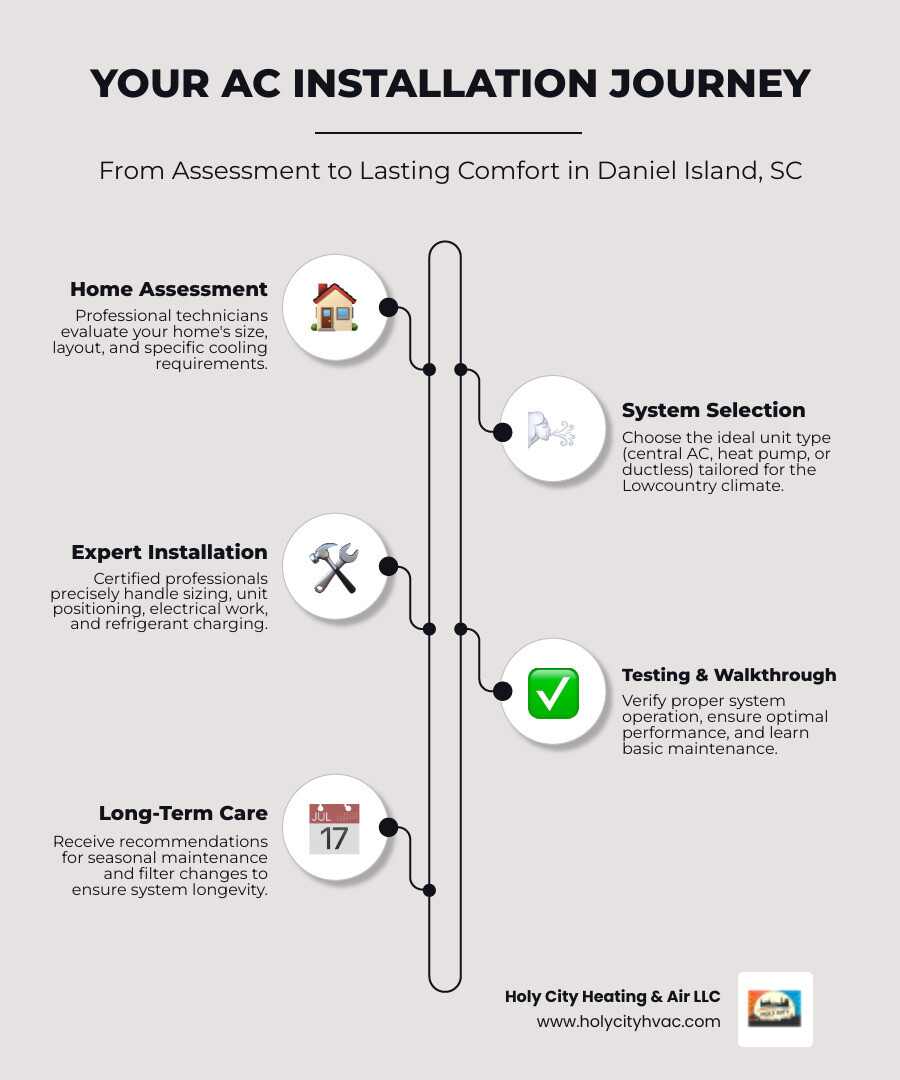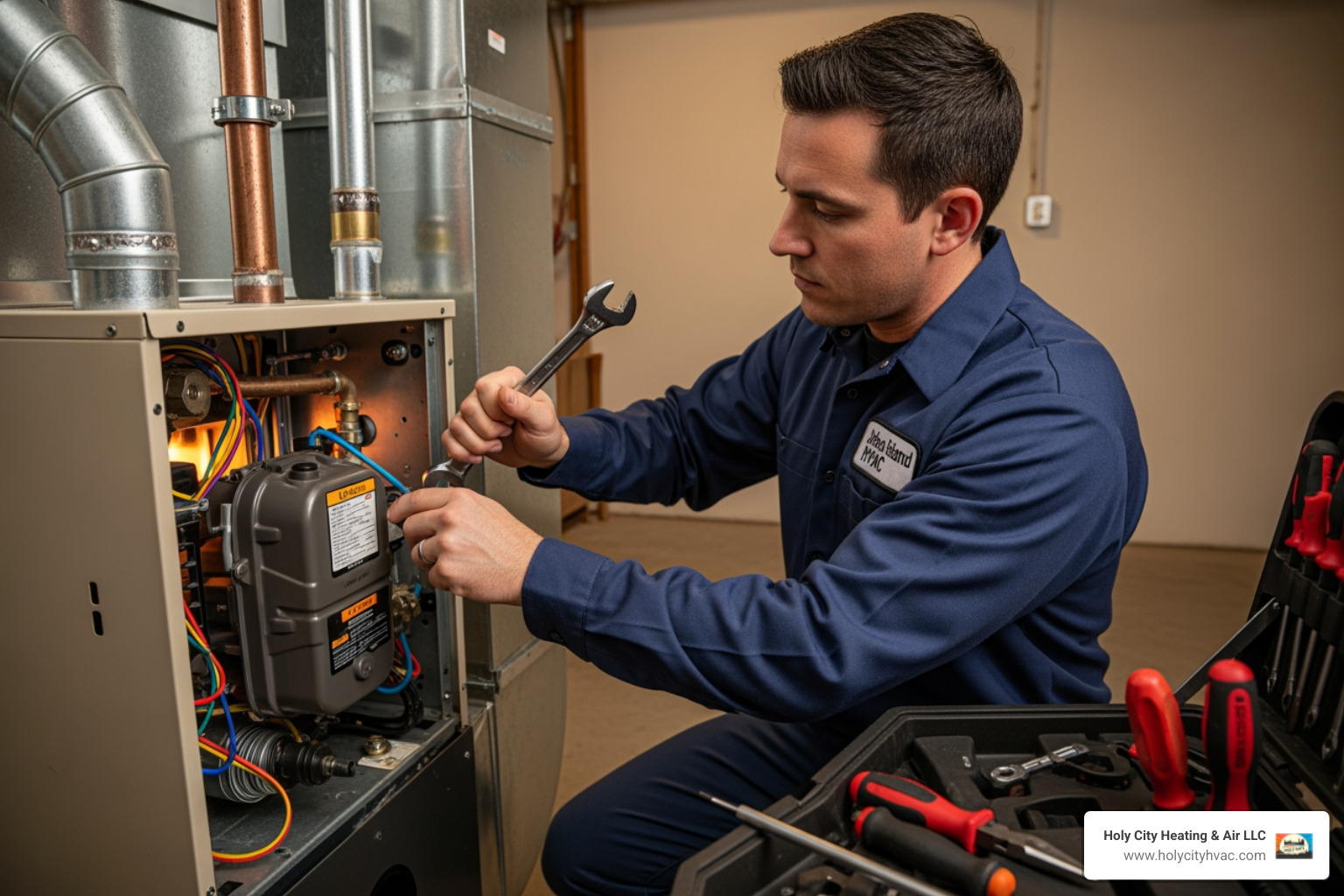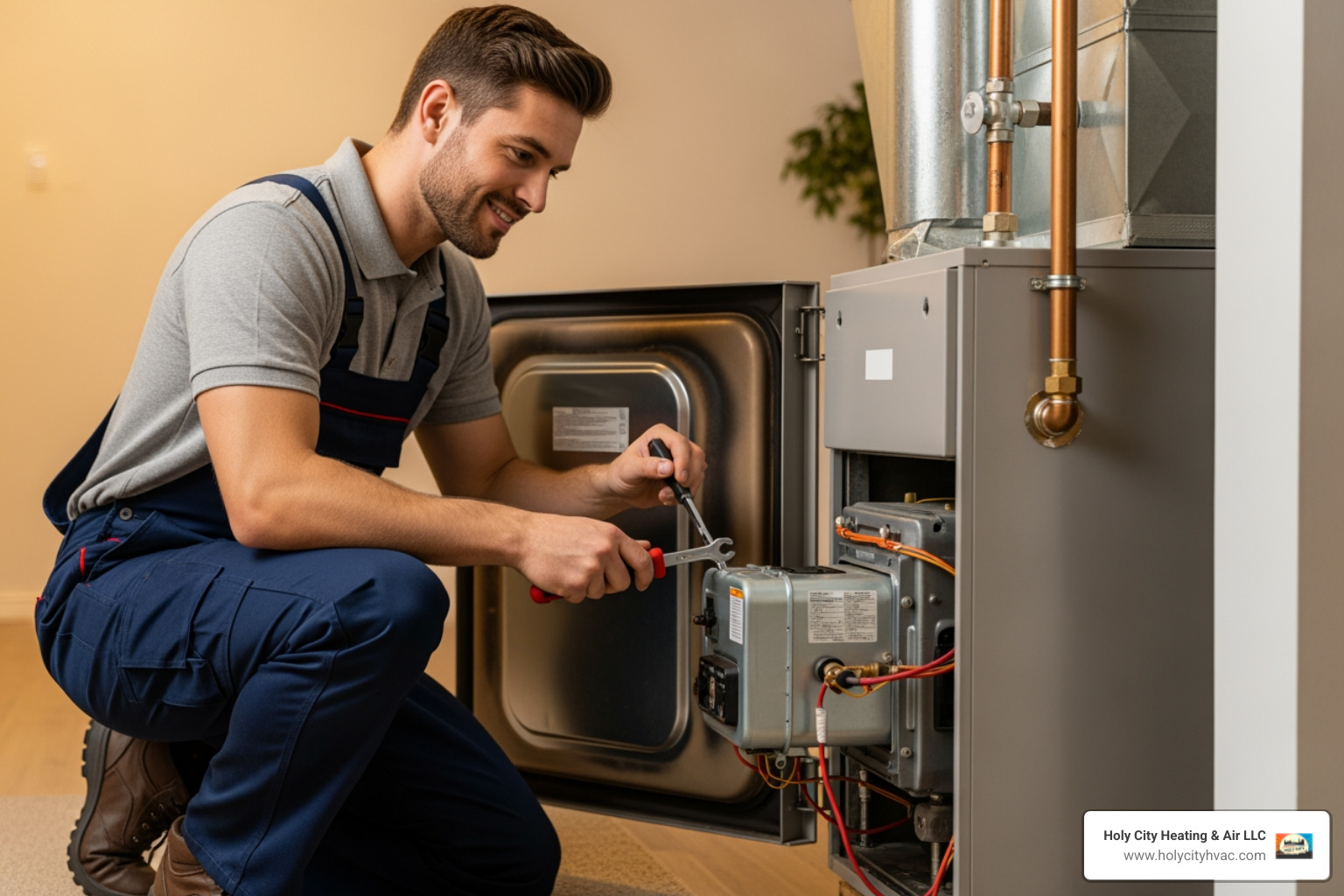
Why Solar Hot Water Maintenance Matters
Proper care makes solar hot water system repairs less frequent, and knowing what to look for can save you thousands in unnecessary replacements.
Common solar hot water system repairs include:
- No hot water - Often caused by faulty thermostats, broken pumps, or electrical issues
- Leaking tanks or pipes - Usually from worn seals, damaged connections, or freeze damage
- Reduced heating efficiency - Typically due to sediment buildup, dirty collectors, or failing components
- Strange noises - Often indicates pump problems, sediment buildup, or air in the system
- Temperature fluctuations - Usually caused by faulty sensors, controllers, or heat exchanger issues
The good news is that most problems are preventable with regular maintenance. The average lifespan of solar hot water systems is 10 years, but with proper maintenance, it can be extended beyond 20 years.
Your solar hot water system works hard year-round for your Charleston home. Like any mechanical system, it needs regular attention to run efficiently. Small issues like dirty collectors can quickly become expensive repairs if ignored.
Understanding your system helps you spot problems early, preventing costly emergencies.
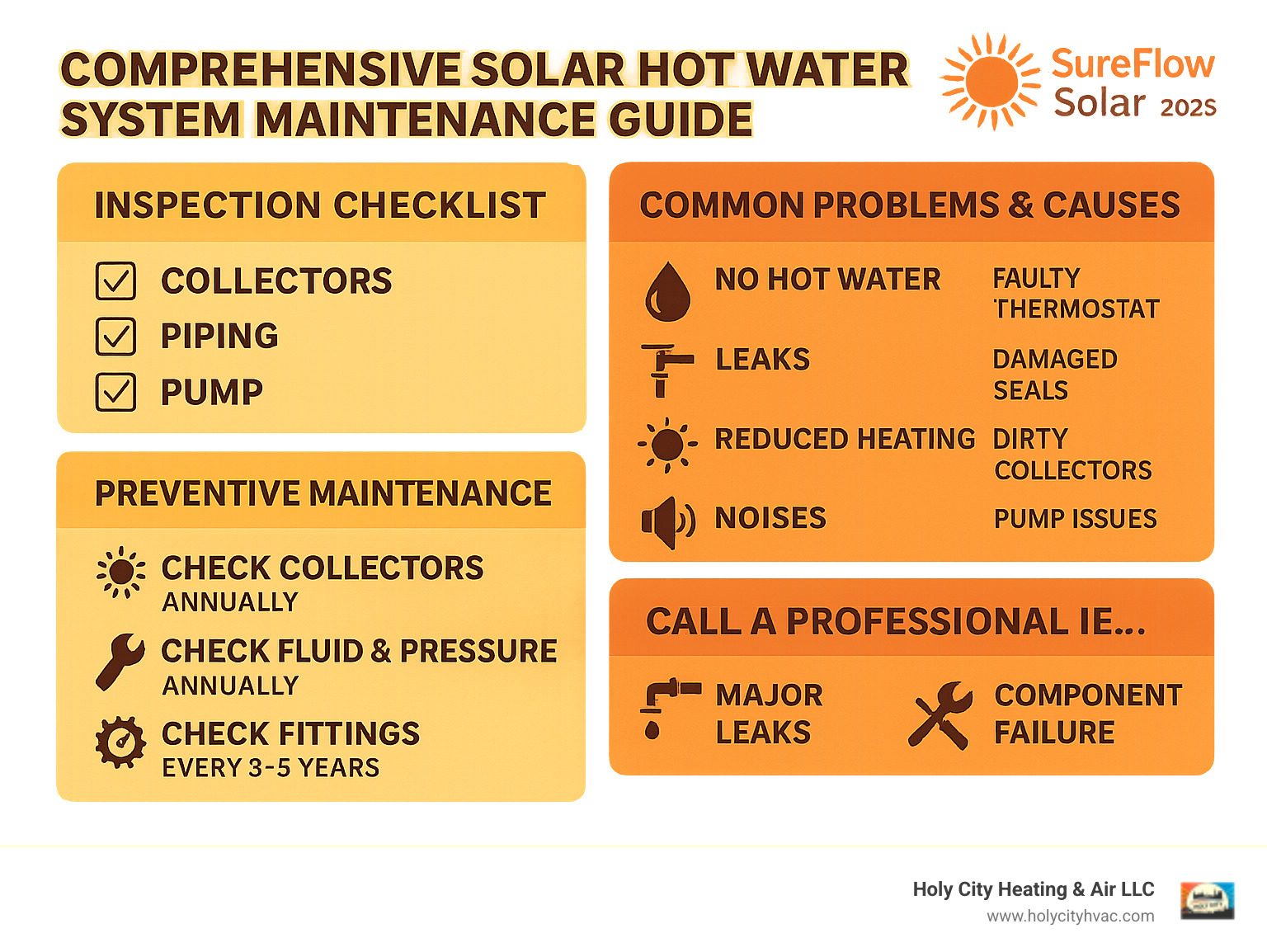
Understanding Your Solar Hot Water System's Key Components
Understanding your solar hot water system's components makes diagnosing solar hot water system repairs much easier. When one part struggles, it affects the entire system's performance.
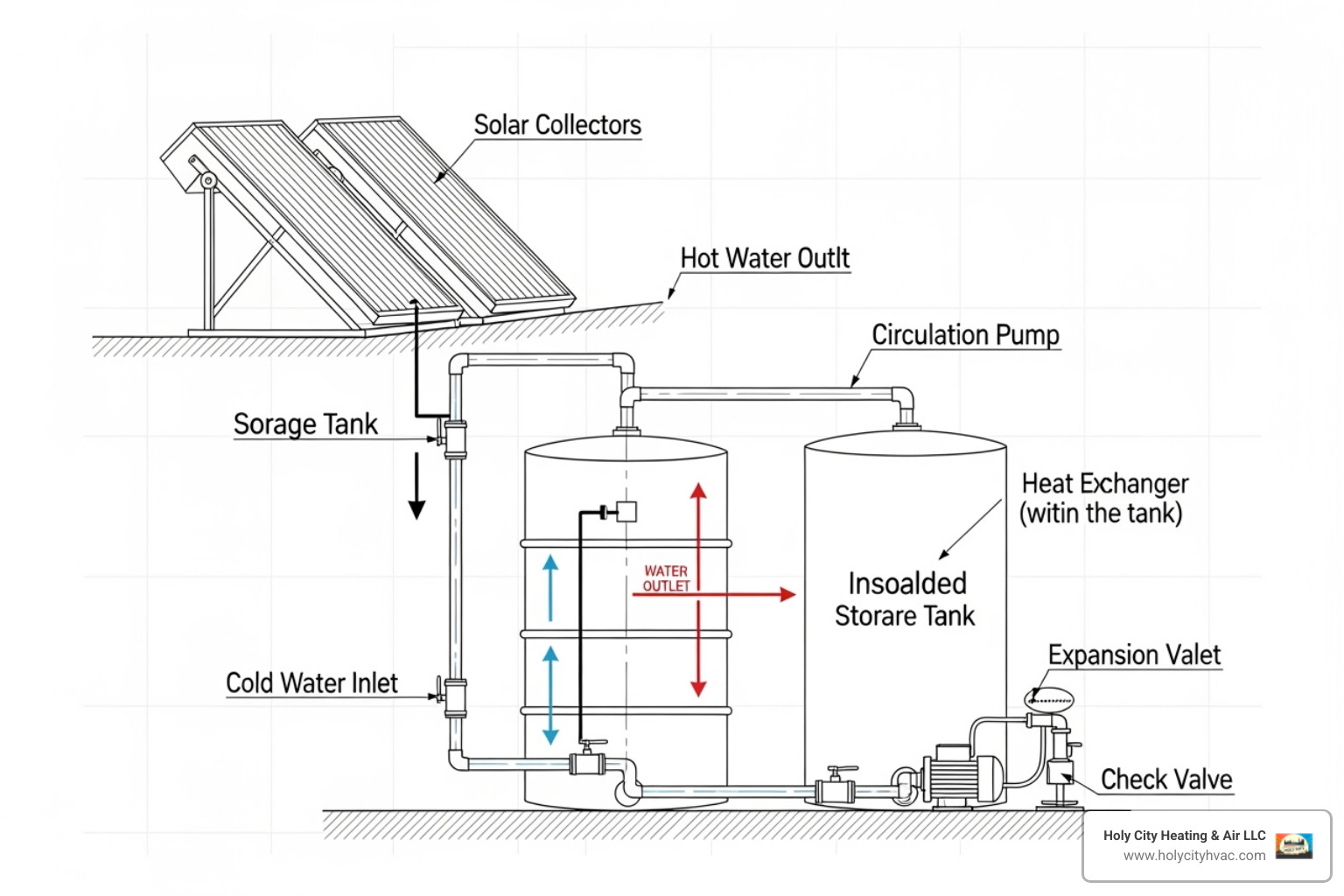
Your system has six main components: solar collectors, an insulated storage tank, a circulation pump, a heat exchanger, a controller, and a backup heater. These components work together in a chain: the controller senses heat in the collectors, activates the pump to move fluid to the heat exchanger, which then warms the water in the storage tank. A breakdown in any part of this chain affects your hot water supply.
Solar Collectors: The Heart of the System
Your collectors are on the roof, converting Charleston's sunshine into heat. They are engineered to capture maximum solar energy.
Flat-plate collectors are common and reliable for Southern weather. They consist of a dark plate with copper tubes under tempered glass, which traps heat like a greenhouse.
Evacuated tube collectors are a high-efficiency option. Each glass tube has a vacuum layer that prevents heat loss, similar to a thermos. Damaged tubes can be replaced individually.
Both collector types heat a fluid to transfer energy. In direct systems, this is your drinking water. In indirect systems, it's often propylene glycol, a non-toxic antifreeze that protects against freezing and needs to be checked every 3-5 years.
The Storage Tank and Circulation System
The insulated storage tank holds the heated water, keeping it hot for hours until needed.
In indirect systems, the heated antifreeze flows through a heat exchanger inside the tank, warming the drinking water without mixing. This prevents pipes from bursting in freezing temperatures.
Your circulation system moves the fluid. Active systems, the most common type, use electric pumps and a controller to circulate fluid only when the collectors are hotter than the tank water, saving energy.
Passive systems use natural convection (hot water rising) for circulation. They are simpler but less efficient and require the tank to be placed above the collectors.
Understanding these components helps you identify issues early and communicate effectively when you need solar hot water system repairs.
A Homeowner's Guide to Diagnosing Common Issues
A cold shower is a clear sign of a problem, but many solar hot water issues have telltale signs you can spot and sometimes fix yourself.
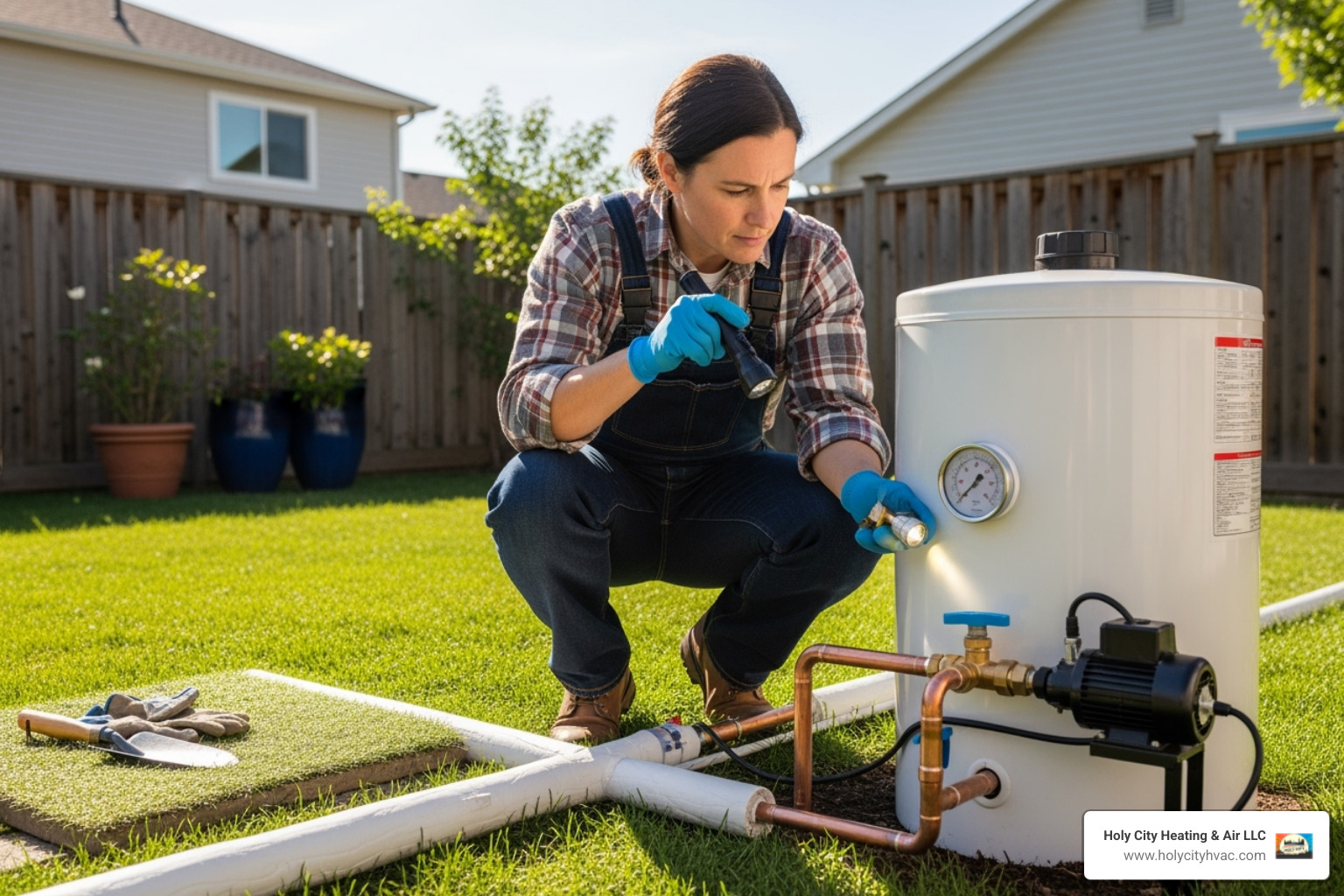
Your system often gives hints before a total failure. Obvious red flags include no hot water or lukewarm water, but also look for low water pressure or strange noises. Leaks are a common culprit, and climbing energy bills can indicate your backup heater is working overtime due to a solar system failure.
This three-step inspection can help you identify the problem.
Step 1: Inspecting the Solar Collectors
Start with the collectors on your roof, as they are exposed to the elements.
Look for debris like dust, leaves, or dirt, which can significantly cut efficiency. Safely cleaning them with a soft brush and water may solve the issue.
Check for new shading from trees or new construction. Collectors need direct sunlight to be effective.
Inspect the glazing (glass covering) for cracks, chips, or damaged seals, which reduce performance and cause leaks. Also, ensure the mounting system is secure to prevent damage.
Step 2: Checking the Storage Tank and Pump
Next, check the ground-level storage tank and circulation system, a common source of issues needing solar hot water system repairs.
Inspect the storage tank for leaks, drips, or corrosion, especially around pipe connections and valves. Small leaks waste significant energy and water.
Listen for rumbling sounds when using hot water, which often indicates sediment buildup in the tank. This is common with hard water and prevents efficient heat transfer.
For active systems, the circulation pump should hum gently when running. Silence or strange noises suggest pump problems. Check for power and tripped breakers.
Air in the system can cause banging or popping noises and poor circulation by impeding fluid flow.
Step 3: Identifying Leaks and Temperature Problems
Leaks and temperature problems are the most common reasons for solar hot water system repairs.
Check for leaks at pipe connections, looking for stains or corrosion. A constantly dripping pressure relief valve also indicates a problem.
Faulty seals wear out over time and are a common source of leaks.
If water isn't hot enough, common causes include dirty collectors (which need cleaning) or sediment buildup in the tank or heat exchanger, which insulates against heat.
Check the thermostat settings on the backup heater; 120°F is a typical, efficient setting.
Loose wiring or faulty sensors can also cause issues, as the controller relies on them to operate the pump efficiently.
Common leak sources include damaged seals, cracked collector tubes or glass, corroded pipes, and leaking pressure relief valves. A systematic check can help you find the source.
Proactive Care: A Preventive Maintenance Checklist
Regular maintenance is key to preventing solar hot water system repairs, ensuring consistent hot water, lower energy bills, and a system that can outlast its warranty.
ENERGY STAR certified solar water heaters use about 60% less energy than standard models, saving you money. To compare models, start your research using the ENERGY STAR Product Finder tool to find and compare certified water heaters.
Most preventive maintenance tasks are simple and don't require a plumbing expert, just consistency.
Managing Sediment and Water Quality
Sediment buildup is a common cause of reduced water temperature, especially with Charleston's hard water, which is rich in minerals like calcium and magnesium.
Hard water creates scale deposits that insulate heating elements, clog pipes, reduce pressure, and cause rumbling sounds from the tank.
Flushing your storage tank annually is a great investment in your system's health. It removes accumulated sediment, and the frequency can be adjusted based on your water quality.
Water softeners are highly effective for hard water, preventing mineral buildup throughout your plumbing system.
For existing scale, a vinegar solution flush every 3-5 years can dissolve stubborn mineral deposits and restore efficiency without damaging the system.
Seasonal and Long-Term Maintenance
Winterizing your pipes is crucial even in the Lowcountry's mild winters. Insulate exposed pipes and ensure drain-down systems can empty completely before a cold snap.
Checking your antifreeze (propylene glycol) in closed-loop systems is essential. A professional should check its concentration and pH every 3-5 years, as it degrades over time.
Annual professional servicing is recommended. A technician can perform deeper checks on the pump, heat exchanger, sensors, and controls, and verify the proper slope of collectors and piping.
Anode rod inspection is vital for steel storage tanks. This sacrificial rod prevents tank corrosion and should be replaced every 3-5 years, which is much cheaper than replacing the tank.
Most solar hot water system repairs are preventable with consistent care, ensuring reliable hot water for your family.
Professional Solar Hot Water System Repairs: When to Call an Expert
While DIY maintenance is great, some solar hot water system repairs require professional expertise for your safety and to prevent costly mistakes. Knowing when to call an expert is essential.
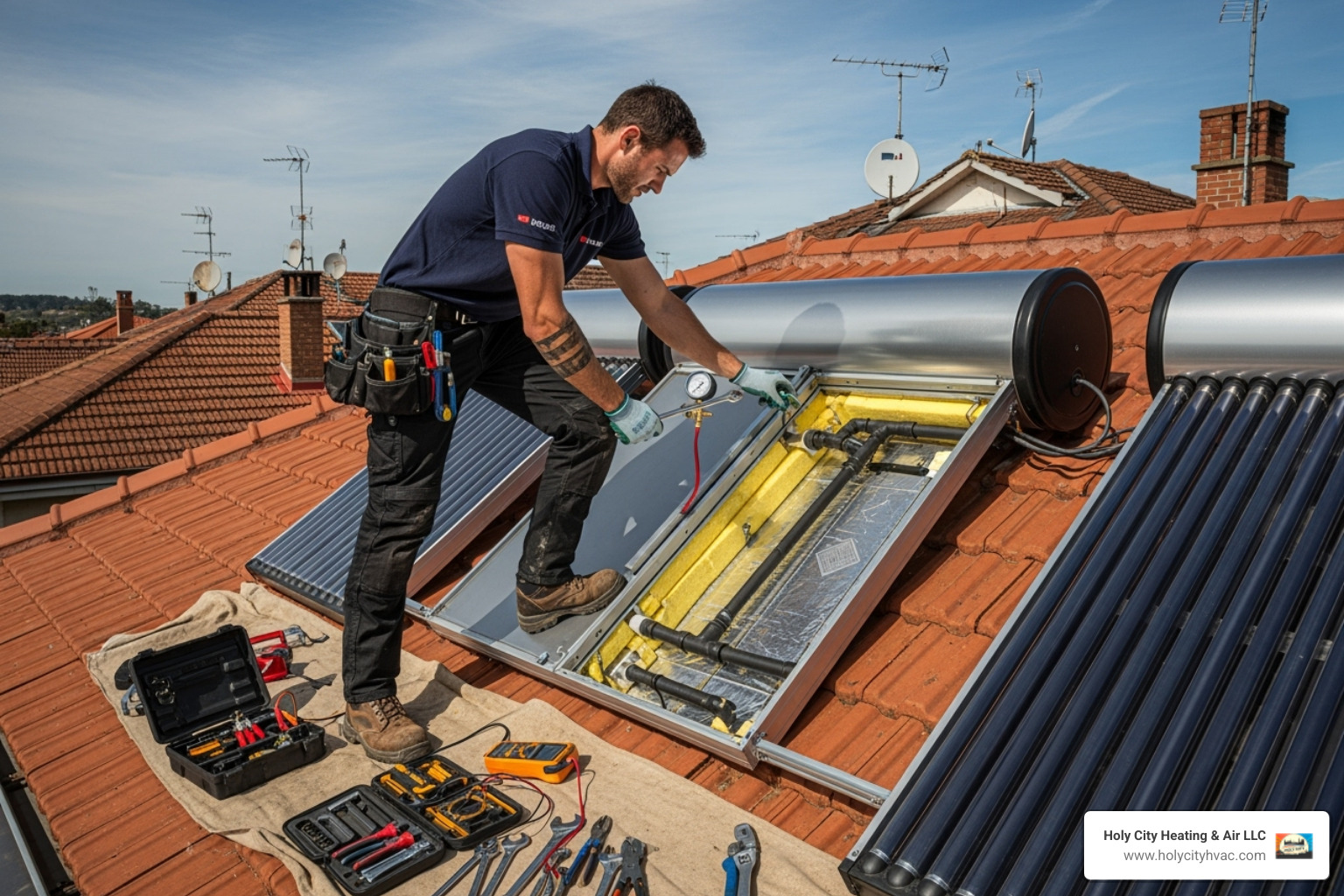
Your system combines water, electricity, and sometimes gas, which can be dangerous if not handled correctly. The EPA-certified, licensed professionals at Holy City Heating & Air have over 20 years of industry expertise to handle these repairs safely. Some repairs require specialized training and tools that only professionals possess.
Signs You Need Professional Solar Hot Water System Repairs
Here are clear signals that it's time to call an expert:
Persistent leaks that you can't fix, or significant leaks from the tank or collectors, require a professional. They can signal deeper issues and cause serious water damage.
No hot water after basic troubleshooting points to complex electrical, mechanical, or control system issues that need professional diagnosis.
Electrical faults, such as a tripping breaker, flickering lights, or a burning smell, are dangerous. Stop and call a professional immediately.
Major component failure, like a dead circulation pump, failed heat exchanger, or broken controller, requires expert repair.
Brown or rusty water from hot taps often indicates internal tank corrosion, which can lead to tank failure.
Consistently poor performance despite maintenance suggests underlying issues like degraded fluid or faulty sensors that need a professional assessment.
What to Expect from a Professional Service Call
When you call Holy City Heating & Air for solar hot water system repairs, you can expect honest, professional service with no surprises.
Our system diagnosis is thorough. Our certified technicians conduct a comprehensive inspection of the entire system, testing every component to find the root cause of the problem.
Written estimates are standard practice. You'll receive a clear, detailed estimate before any work begins, with no hidden fees.
Our certified technicians bring real expertise. Our team is EPA-certified, licensed, and continuously trained. We've served the Charleston area since 2015.
Warranty information provides peace of mind. We stand behind our work with product warranties and our Daikin Comfort Promise, so you know you're covered.
Expert advice is always included. Our technicians provide honest advice to help you understand your options and make smart decisions for your system.
We proudly serve Charleston, Kiawah Island, Johns Island, Mt Pleasant, North Charleston, Daniel Island, Edisto Island, Folly Beach, Goose Creek, Hollywood, Isle of Palms, James Island, Ravenel, Seabrook, Sullivan's Island, Summerville, Wadmalaw, and West Ashley, SC. For reliable hot water repairs and installations today call now Holy City Heating & Air - Hot Water Heater Repair.
Because let's face it – life's too short for cold showers.
Frequently Asked Questions about Solar Hot Water Heaters
Here are answers to the most common questions we hear from Charleston families about solar hot water systems.
How long do solar hot water systems typically last?
While often cited to last 10 years, a well-maintained solar hot water system can last for 20 years or more.
Regular maintenance is the biggest factor in a system's longevity; annual check-ups can significantly extend its lifespan.
Component quality also matters. Higher-quality parts last longer than cheaper alternatives.
In Charleston, environmental factors like salt air, storms, and humidity can cause components to age faster.
Water quality is another factor. Hard water, common in Charleston, can cause mineral buildup that shortens component life, but regular flushing helps minimize this.
How often should I have my solar hot water system professionally serviced?
We recommend an annual professional inspection to catch small issues before they become expensive solar hot water system repairs.
During an annual visit, a technician can safely access and clean all components, verify controls, and check for wear and tear.
The glycol heat transfer fluid should be checked every 3 to 5 years. It breaks down over time and may need replacing to ensure freeze protection.
Tank flushing schedules depend on your water quality. Depending on water hardness, this may be needed annually or every 3 years. A technician can advise on the best schedule for you.
For steel tanks, the anode rod should be inspected every 3 to 5 years. This sacrificial rod prevents tank corrosion, and replacing it is much cheaper than replacing the tank.
Can I perform all solar hot water system repairs myself?
While some DIY maintenance is great, it's important to know where to draw the line for safety.
DIY tasks are encouraged. Homeowners can handle visual inspections, cleaning collectors safely from the ground, checking for leaks, monitoring performance, and often, flushing the tank.
However, there are safety risks. Systems involve electricity, high-pressure hot water, and sometimes gas. Electrical components can cause shocks, hot water can cause burns, and gas boosters must be handled by licensed professionals.
Working on rooftop collectors is also a safety risk due to the height and requires proper equipment and experience.
Call a professional for persistent leaks, electrical issues, strange internal noises, or a complete loss of hot water.
Our licensed professionals at Holy City Heating & Air have the training, tools, and experience to diagnose complex problems safely. We'd rather help you avoid injury and prevent small issues from becoming big, expensive ones. After all, solar hot water system repairs done right the first time save you money and headaches in the long run.
Keep Your Hot Water Flowing with Expert Care
Your solar hot water system is more than just pipes and panels – it's your gateway to consistent hot water, significant energy savings, and a smaller carbon footprint. When you understand how it works and give it the care it deserves, you're setting yourself up for years of reliable performance and peace of mind.
The secret to avoiding costly solar hot water system repairs lies in catching problems early. That strange noise from your pump? Don't ignore it. Water not quite as hot as usual? Time to investigate. Whether it's something as simple as cleaning debris off your collectors or as complex as replacing a faulty heat exchanger, knowing when to roll up your sleeves and when to call the professionals makes all the difference.
At Holy City Heating & Air, we've been helping Charleston families stay comfortable since 2015. As a family-owned business, we understand that your home is your sanctuary. Our EPA-certified, licensed professionals don't just fix problems – we build relationships. With over 20 years of combined industry expertise, we've seen it all, from simple maintenance tasks to complete system overhauls.
We know that dealing with hot water problems can be stressful. Nobody wants to start their morning with a cold shower or watch their energy bills climb because their backup heater is working overtime. That's why we invest heavily in training our team and staying current with the latest technologies and best practices. When you call us, you're getting more than just a repair service – you're getting partners who genuinely care about your comfort.
Our commitment goes beyond the repair itself. We back our work with comprehensive Daikin warranties and the Daikin Comfort Promise, giving you confidence that your investment is protected. We believe in doing things right the first time, using quality parts, and standing behind our work.
For expert service on all types of water heaters, including solar, visit our water heaters service page. Whether you need routine maintenance, emergency repairs, or guidance on maximizing your system's efficiency, we're here to help you harness the sun's power for years to come. Let us help you keep that hot water flowing smoothly and efficiently!
Recent posts






